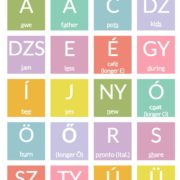The 10 Most Important Hungarian Verbs (and how to Use them!)
“Where do I start learning Hungarian vocabulary? Which Hungarian words should I learn first? Literally every Hungarian-learner asks themselves this question at least once – and rightly so. The amount of words in every new language is overwhelming and it seems like each and every app, teacher and course has a different approach and notion about what is important at which stage and what isn’t.
This is how you end up learning five different ways to say hello and goodbye (for every time of the day and degree of formality) and various animals and foods, but still find yourself not understanding anything of what others are saying around you and still not being able to form a proper sentence.
That’s because you set a lot of your precious focus on stuff that really doesn’t matter so much. But what if, instead, you could achieve more with a lot less effort? What if just a few (important) words would help you understand and say a lot more, in a shorter time? Welcome to the Pareto principle (aka the 80/20 rule or “law of the vital few”) in Hungarian vocabulary learning!

Oh, please, not another new word!
Don’t worry. All the Pareto principle says is that you get 80% of the results from 20% of the work. It is not only applied to Hungarian learning or even language learning but to all areas of life and the world in general. For example, Microsoft found that with fixing only the top 20% of their most-reported bugs 80% of the related errors and crashes in their systems would be eliminated.
Great, but what does this have to do with my struggles with Hungarian verbs and vocabulary?
Well, instead of focusing on those thousands of irrelevant words most textbooks suggest and that you will never use, focus on those words you simply cannot get around and that make out a significant part of all Hungarian conversations, and written material. Just think about it – around 300 words make out 65% of all written material in English and with 2,000 words you have 80% of all conversations and texts covered.
So why am I stressing this only to focus on not more than 10 verbs? Isn’t that a bit too little, all that Pareto-stuff aside?
I’m sure that most of you already know the meaning of these words in theory. Most Hungarian-learners will very quickly learn that “van” means “to be” (or something like that), “megy” means “to go” and “csinál” means “to do”. However, in Hungarian it is not enough to simply learn these words and to associate one single meaning to them and move on because they will give you headaches and headaches again.
The most important Hungarian verbs not only occur frequently, but also often have more multiple and subtle meanings (apart from their “main” meaning). Additionally, Hungarians often ornament them with various prefixes that, again, alter their meaning. This makes “megy” so much more than a simply “to go” and it is not enough to learn this one definition.
Learning the most important Hungarian verbs properly and actually knowing how to use them will bring you a giant step further towards fluency and is worth many times more than just learning “random” new words your book suggests.
Note #1: Although it’s “just” ten verbs, this article is long and hammering all verbs into your short-term memory doesn’t make sense. You should rather use it as a reference. That’s why we’ve poured it all into a handy PDF for you. This way, you can put it on your phone, tablet or desktop, come back to it anytime, print it, use your marker and even add your own example sentences.
Note #2: The following article will not deal with and teach you the conjugation of the verbs. Instead, we’re focusing on their various meanings and application. The example sentences you will read will use the verbs in various forms, moods, tenses and persons. Don’t worry however if you haven’t joined the club of the Hungarian conjugation-heroes yet (hint: most of us haven’t!). Instead, just open the amazing Cooljugator before you keep reading and always type in the respective verb you’re dealing with. It will give you all forms of the verb you can imagine and more and you’ll be able to follow along smoothly.
But now enough of the talk – let’s do the walk! Here are the 10 most important Hungarian verbs – and how to use them.
Quick navigation through the verbs:
- Important Hungarian Verb #1: Van – To be / to exist
- Important Hungarian Verb #2: Nincs – the verb for non-existence
- Important Hungarian Verb #3: Kell – to have to, to be needed / necessary, to need
- Important Hungarian Verb #4: Megy – to go, to work (i.e. function)
- Important Hungarian Verb #5: Jön – to come
- Important Hungarian Verb #6: Csinál – to make, to do
- Important Hungarian Verb #7: Tesz – to put & to do
- Important Hungarian Verb #8: Vesz – to take, to buy
- Important Hungarian Verb #9: Mond – to say
- Important Hungarian Verb #10: Beszél – to talk
Important Hungarian Verb #1: Van
Meaning: to be / to exist
“Van” is by far the most frequent Hungarian verb and can be somewhat unfamiliar at first, as it has no direct English equivalent. Its closest meanings in English are “to be” and “to exist”, but the actual usage of “van” is more nuanced and diverse. No Hungarian-learner can get around understanding “van” and its several applications. The best way to get there is by paying attention to how Hungarians use it in both spoken and written language.
To cover all fine nuances of “van” would go beyond the scope of this article, but understanding its following two applications will help you grasp “van” in most cases you’ll encounter it.
Note: If you’ve been with us for a while you know that we always provide two translations with every example sentence – a regular and a literal (word-to-word) translation. You will see the latter in italics.
1.2 “Van” as “to be”:
The primary usage of “van” is similar to the English “to be”:
Itt van a kulcs.
Here is the key.
Here is the key.
Nyolc óra van.
Eight clock is.
It is eight o’clock.
Otthon vagyok.
At-home am-I.
I am at home.
Hol vagy? / Hogy vagy?
Where are-you? / How are-you?
Where are you? / How are you?
1.2. Expressing “to have” with “van”:
This is the slightly more difficult part. You might’ve noticed that the verb “to have” doesn’t exist in Hungarian. Instead, Hungarian uses “van” and expresses “to have” by saying that something exists for someone to be his / hers / its property.
How to use “van” for expressing “to have”:
In short, this is the magic formula you will need to apply when expressing possession with “van”:
| Owner (possessor) + -nak”/nek” (for emphasizing purposes) | possession + appropriate personal possession suffix | the verb – to be |
Sounds confusing? Let’s see some examples:
First, it is important to distinguish whether the owner (possessor) is a personal pronoun you don’t further specify (I, you, he/she/it, etc.) or a specific person or thing which you label (name).
The first case (possessor = personal pronoun) will look like this:
(Nekem) két testvérem van.
(For-me) two sibling-my exists.
I have two siblings (kids, cats…).
(Neked) sok pénzed van, de kevés időd.
(For-you) much money-yours exists, but little time-yours.
You have a lot of money but little time.
I have put “nekem” and “neked” in brackets, because you don’t need to actually add them if the owner (possessor) is a personal pronoun not specified further. This changes our above formula to the following:
| possession + appropriate personal possession suffix | the verb – to be |
In the first example, the two siblings exist for me to be my property.
In the second, a lot of money exists for you to be your property.
If however the owner (possessor) is a specific person or thing which you label, you will have to add the possessive suffixes “-nak” or “-nek”:
Zsuzsinak van egy lakása.
Zsuzsi-for exists a flat-hers.
Zsuzsi has a flat.
Ennek a kutyának van gazdája.
This-for the dog-for exists owner-of.
This dog has an owner.
1.3. To be or not to be – when to use “van” and when to drop it?
There are many confusions circulating around when you actually must add “van” and when you must drop it (note: yes, “must” is the correct term here – you (usually) either must or mustn’t use it in a particular sentence construction – see exception below.)
Rule of thumb:
In the third person (singular and plural) use “van” only in sentences about location or containing existential construction (i.e. there is/are).
Omit “van”, when talking about qualities or when talking about what someone/something is.
Examples for using “van“:
Juli a házban van.
Juli the house-in is.
Juli is in the house.
Van egy könyv az asztalon.
Is a book the table-on.
There is a book on the table.
Examples for not using “van“:
Juli nagyon szép / okos / büszke.
Juli very beautiful / intelligent / proud.
Julis is very beautiful / intelligent / proud.
Péter magyartanár.
Péter Hungarian-teacher.
Péter is a Hungarian teacher

1.4. “Van” and its prefixes:
“Van” can come with three main prefixes that each change its meaning. Let’s see them one by one:
megvan (valami) – to be found, to be revealed
Megvan a kulcsom!
Found-is the key-my!
I’ve found my keys!
Megvan a megoldás; Anna rájött!
Revealed-is the solution; Anna onto-came!
The solution is revealed; Anna figured it out!
kivan (valamin, valamitől, valami miatt) – to be exhausted, annoyed, unnerved about / because of sth.
Teljesen kivagyok ezután a tizennégy órás repülőút után.
Completely exhausted-am-I this-after the 14-hour-ish flight-after.
I’m completely exhausted after this 14-hour flight.
Kivagyok Palitól; annyira idegesítő!
Annoyed-am-I Pali-by; so-much unnerving!
I’m so annoyed by Pali; he’s so unnerving!
elvan (valamivel) – to be occupied, to not be bored, to be content with the moment, to “be good”
-Nézünk valami filmet? -Most nem, elvagyok most itt.
-Watch-shall-we some movie(acc.)? -Now not, content-am-I now here.
-Shall we watch a movie? -Not now; I’m good for now.
Olyan cuki a baba; olyan édesen elvan a játékaival.
So cute the baby; so sweetly occupied the toys-its-with.
The baby is so cute how it so sweetly occupies himself (is occupied) with its toys.
Important Hungarian Verb #2: Nincs
Meaning: to not be, to not exist
Almost as often as expressing that something “is” (i.e. does exist) or that someone does have something are we saying that there “isn’t” something or that someone does not have something. This is, where “nincs” jumps in.
“Nincs” is another substantial verb and has no direct English equivalent. It’s the opposite of “van”: the verb for the act of non-existence. The closest expressions it comes to in English are “to not be” and “to not have”.
Do not worry however, as once you’ve understood “van”, “nincs” will be a walk in the park for you. Let’s see some examples:
2.1. “Nincs” as “to not be”
Nincs itt a férjem.
Not-is here the husband-my.
My husband is not here.
Note: “Nincs” as “to not be” only works in the third person singular and plural (he/she/it isn’t = nincs instead of “nem van” and they aren’t = nincsenek instead of “nem vannak”). However, for all other grammatical persons you use “nem” + the conjugated “van”:
I am not = nem vagyok;
you are not = nem vagy;
we are not = nem vagyunk;
you(pl.) are not = nem vagytok.
2.2. “Nincs” as “to not have”
As the verb “to have” doesn’t exist, Hungarians express “to not have” with “nincs” (similarly as they express “to have” with “van” – see above) by saying that something does not exist for someone to be his / her / its property:
(Nekem) nincs se pénzem, se időm.
(For-me) not-exists neither money-my, nor time-my.
I have neither time nor money.
(Neked) nincsenek állataid.
(For-you) not-exist pets-yours.
You don’t have pets.
(Nekünk) nincs más választásunk.
(For-us) not-exists other choice-ours.
We don’t have another choice.
Just like with “van” you don’t need “nekem” or “neked” when dealing with personal pronouns but need the possessive suffixes when dealing with someone / something specific:
Zsuzsinak és Petinek nincs lakásuk.
Zsuszi-for and Peti-for not-exists flat-theirs.
Zsuzsi and Peti do not have a flat.
Ennek a kutyának nincs gazdája.
This-for the dog-for not-exists owner-of.
This dog doesn’t have an owner.
2.3. “Nincs” and its prefixes
“Nincs” is a somewhat special case, as its applicable prefixes aren’t actually added to it but come after, as a separate word. The same three prefixes are relevant here, as in the case of “van”:
“nincs meg” instead of “megnincs”
Nincs meg a kulcsom, hova tettem?
Not is-found the key-my, where-to put-I?
I cannot find my keys (“my keys are unfound”), where did I put them?
“nincs ki” instead of “kinincs”
Nincs ki Dani még Annától szerinted?
Isn’t exhausted Dani yet Anna-from in-your-opinion?
Isn’t Dani exhausted from Anna by now?
“nincs el” instead of “elnincs”
Állandóan szórakoztatni kell a babát, mert nincs el magától.
Constantly to-entertain to-have-to the baby(acc.), because doesn’t occupy itself-from.
The baby has to be entertained constantly because it doesn’t occupy itself.
Important Hungarian Verb #3: Kell
Meaning: to have to, to be needed, to be necessary, to need
Think of how often you use a form of “to need” in English. The Hungarian “kell” is even more prevalent, as, apart from “to need” it some further applications and nuances. The Hungarian word “kell” has two main usages: “to have to” and “to need”. Let’s see both of them separately.
3.1. “Kell” as “to have to”
Note how in the following examples “kell” doesn’t change its form but stays in the third person singular. This is, because unlike in English it is not the subject that has to do something actively but it is the action that needs to be done.
Mennem kell.
Go-shall-I has-to.
I have to go.
Subject: I, but it is the going that has to be done.
Elrontottam a gyomrom, ezért diétáznom kell.
Ruined-I the stomach-my, therefore to-diet-shall-I has-to.
I ruined my stomach and therefore have to be on a diet.
Subject: I, but it is the dieting that has to be done.
Minden nap menned kell dolgozni.
Every day go-shall-you has-to to work.
You have to go to work every day.
Subject: you, but it is again the going (to work) that has to be done.
3.2. “Kell” as “to need”
Note how in the following examples on the other hand “kell” gets conjugated, as it is the subject that is needed:
Ez még kell nekem; ne dobd ki!
This still needed for-me; not throw-it-you(imp.) out!
I still need this; don’t throw it out!
“Ez” is the subject – “kell” is in third person singular.
Én már nem kellek itt, úgyhogy megyek haza.
I anymore not needed here, so-that go-I home.
I’m not needed here anymore, so I’ll go home.
“Én” is the subject – “kell” is in the first person singular.
Ne menj el, kellesz nekem!
Not go-you away, needed-you for-me!
Don’t go away; I need you!
“Te” is the subject, “kell” is in the second person singular.
Note: You cannot add any prefixes to “kell”.
Important Hungarian Verb #4: Megy (valahova)
Meaning: to go, to work (i.e. to function)
After having covered the more complex verbs “van”, “nincs” and “kell” its now time to start paddling on somewhat simpler waters. “Megy” first and foremost means “to go” and – by itself – is pretty straightforward:
4.1. “Megy” as “to go”
Holnap megyek egy állásinterjúra.
Tomorrow go-I a job-interview-onto.
I’ll go to a job interview tomorrow.
Hányra mész holnap dolgozni?
How-much-onto go-you tomorrow to-work?
When will you go to work tomorrow?
Anna csak esténként megy futni.
Anna only evenings goes to-run.
Anna only goes running in the evenings.
4.2. “Megy” as “to work”
Apart from “to go”, “megy” has another important meaning. Hungarians use it to express that something is working. Luckily, this is too really straightforward:
Nem megy; nem tudom megcsinálni.
Not works; not can-I to-do-it.
This doesn’t work; I cannot do it.
Jól megy neked nagyon a matek!
Good works for-you very the maths!
Doing maths works really well for you. (Meaning: You’re very good at maths!)
Note: When functioning as “to work”, “megy” always remains in the third person singular, as it is the object of the sentence that is functioning.
4.3. “Megy” and its prefixes:
“Megy” can come with quite a few prefixes, most of them being pretty straightforward, as they specify the direction of the movement (in, out, down up). There are some though that change the meaning of “megy” completely. Let’s see all of them one by one:
kimegy / bemegy (valahova / valamin) – to go in / out to somewhere / into sth. / out of sth.
Kimegyek egy kicsit a friss levegőre.
Out-go-I a little the fresh air-onto.
I’ll go out to catch some fresh air.
-Hol van Imi? –Bement, mert fázott.
-Where is Imi? –In-went, because felt-cold.
-Where is Imi? -He went inside, because he felt cold.
felmegy (valamin / valamire) – to go up sth.
István felment a padlásra.
István up-went the attic-onto.
István went up to the attic.
lemegy (valamin / valamiről / valami) – to go down from something, to proceed from start to finish.
Hozz egy sört, ha lemész a pincébe!
Bring-you a beer(acc.) when down-go-you the basement-into!
Bring a beer with you when you go down to the basement!
Akkor megyek el WC-re, ha lement a műsor.
Then go-I away toilet-onto, if down-went (i.e. finished to the end) the show.
I’ll go to the toilet once the show has finished / went down.
elmegy (valahova) – to go away; to be “just all right”, okay-ish, mediocre, average; to come sexually
Elmegyek a boltba; kérsz valamit?
Away-go-I the store-into; ask-you-for something(acc.)?
I’ll go (away) to the store; do you want something?
-Milyen volt a film? –Elment; nem volt semmi különös.
-What-kind-of was the movie? –It-was-all-right; not was nothing special.
-How was the movie? –It was okay; nothing special.
Nem hagyták abba, amikor a lány elment.
Not left-it that-into, when the girl came.
They didn’t stop after the girl came.
rámegy (valamire) – to go onto something; to fit; to put one’s focus onto something specific
Anna nem akart rámenni a hídra, mert nagyon rozoga volt.
Anna not wanted onto-to-go the bridge-onto, because very rickety was.
Anna didn’t want to go onto the bridge because it was very rickety.
Bence úgy megnőtt, hogy már nem megy rá egyik cipője sem.
Bence so grew, that anymore not fits one-of shoe-his neither.
Bence grew so much that none of his shoes fit him anymore.
Holnaptól rámegyek a lábedzésre, mert azzal van a legtöbb gondom.
Tomorrow-from focus-I the leg-training-onto, because that-with exists the most problem-my.
From tomorrow onwards I’ll focus on training my legs because that’s what causes me the most problems.
utánamegy (valaminek / valakinek) – to go after so. / sth.
Tomi elrohant, úgyhogy inkább utánamegyek.
Tomi away-ran, so-that rather after-him-go-I.
Tomi ran away, so I’ll rather go after him.
belemegy (valamibe) – to fit into sth., to agree to sth.
Szerinted belemegy a saláta ebbe az edénybe?
Do-you-think fits the salad this-into the pot-into?
Do you think the salad will fit into this pot?
Tuti, hogy nem fogok belemenni ebbe a szerződésbe.
For-sure, that not will-I to-agree this-into the contract-into.
I will definitely not agree to this contract.
átmegy (valamin / valakihez / valamihez / valamibe) – to go over (to) so. / sth.; to turn into sth. else
Ez a vita átment veszekedésbe.
This debate turned into a fight.
This the debate turned fight-into.
hozzámegy (valakihez) – to get married to so.
András megkérte a kezem, úgyhogy szeptemberben hozzámegyek.
András asked-it the hand-my, so-that September-in married-get-I-to him.
András and I got engaged so I’ll marry him (“get married to him”) in September.

Important Hungarian Verb #5: Jön (valahova / valahonnan)
Meaning: to come (somewhere / from somewhere)
Even more straightforward than “megy” is its opposite ”jön” – it simply means “to come” and has no additional, “hidden” meaning, if standing by itself.
–Jössz este? –Jövök!
–Come-you evening? –Come-I!
-Are you coming tonight? -Yes, I’ll come!
Várjunk még egy kicsit, mert Tomi is jön!
Wait-we yet a little(acc.), because Tomi as-well comes!
Let’s wait a little longer, because Tomi is coming, too!
Jövő hónapban jön a baba.
Next month-in comes the baby.
The baby is coming in a month.
5.1. “Jön” and its prefixes
Similarly to “megy”, “jön” can come with lots of prefixes. Many of them simply indicate the direction of the action, but some also change the meaning of “jön” completely. Let’s see all forms of “jön” one by one:
megjön – to arrive, also referring to one’s period
Megjöttem; itthon vagyok!
Arrived-I; at-home am-I!
I arrived; I’m home!
Görcsöl a hasam, amióta tegnap megjött.
Cramps the belly-mine, since yesterday period-arrived.
My belly is cramping since I got my period yesterday.
átjön (valahova / valamin / valakihez / valami) – to come over (to so., somewhere); to cross sth; to come across
Akkor este átjövök hozzád, az ok?
So I’ll come over tonight, is that okay?
The evening over-come-I to-you, that okay?
Alig mertem átjönni ezen a hídon.
Barely dared-I to-across-come this-on the bridge-on.
I almost didn’t dare to cross this bridge.
Az átjött, hogy nem tetszett, amit mondtam.
That across-came, that not likeable-for-you, what(acc.) said-I.
It came across that you didn’t like what I said.
bejön (valahova / valakinek) – to come in to somewhere, to be likeable for someone (romantically) – to fancy so.
Bejöhetek a szobába?
In-come-allowed-am-I the room-into?
Can I come into the room?
Petinek nagyon bejön Zsuzsi.
Peti-for very likeable-is Zsuzsi.
Peti is really into Zsuzsi.
kijön (valahonnan / valahova / valami) – to come out to somewhere / form somewhere, to be the result
Kijössz hozzám a kertbe?
Out-come-you to-me the garden-into?
Do you want to come out into the garden to me?
lejön (valamiről / valahonnan / valahova / valami) – to come down from somewhere, to be obvious
Nézd, nem tud lejönni a cica a fáról!
Look-you(imp.), not can to-down-come the cat the tree-from!
Look, the cat cannot come down from the tree!
feljön (valahova / valamire) – to come up (to somewhere)
Feljövök veled a padlásra.
Up-come-I with you the attic-onto.
I’ll come up to the attic with you
eljön (valahova / valamire) – to come along (to somewhere)
Andi eljön velem este a koncertre.
Andi along-comes with-me evening the concert onto.
Andi will come along to the concert with me tonight.
rájön (valamire) – to figure sth. out, to find sth. out
András rájött, hogy hazudtam neki.
András figured-out, that lied-I to-him.
András figured out that I lied to him.
belejön (valamibe) – to get better / good at sth.
Jó ez a játék; kezdek belejönni.
Good this the game; start-I to-get-good-at-it.
This is a good game; I’m starting to get good at it.
hozzájön (valakihez) – to get married to sth.
Hozzám jössz?
To-me come-you?
Will you marry me?
Meaning: to make (sth.) (i.e. “to create”), to do (sth.)
“Csinál” both means “to make” and “to do” which makes it easily one of the most frequent verbs of the Hungarian language. At the same time, its ambiguity often leads to confusion regarding its usage and understanding. The following examples shall bring some light into the darkness:
6.1. “Csinál” as “to make” (i.e. “to create”)
Csinálok este egy tortát.
Make-I evening a cake.
I’ll make a cake tonight.
Peti éppen tüzet csinál.
Peti right-now fire(acc.) makes.
Peti is making a fire.
Egy igazi férfit fogok csinálni belőled.
A real man(acc.) will-I to-make out-of-you.
I will make a real man out of you.

6.2. “Csinál” as “to do”
Mit csinálsz ma este?
What do-you today evening?
What are you doing tonight?
Mit csináljunk; mihez van kedved?
What do-shall-we(imp.); what-to exists mood-yours?
What shall we do; what would you fancy?
Mit fogsz csinálni egyetem után?
What will-you to-do university after?
What will you do after university?
6.3. “Csinál” and its prefixes
Unlike in the case of the previous verbs, all prefixes of “csinál” change the meaning of the verb and some even turn it into something colloquial or vulgar:
megcsinál (valamit) – to finish sth.
Először megcsinálom a beadandót, utána megyek el bulizni.
First finish-I the deliverable(acc.), afterwards go-I away to-party.
I’ll first finish the deliverable and only go out to party afterwards.
kicsinál (valakit) – to bully so., to get the best of so., to “finish” so.
Kicsinálom azt, aki az utamba áll.
Finish-I that(acc.), who the way-my-in stands.
I’ll finish those who stand in my way.
becsinál – to sh*t one’s pants (colloq.)
Annyira izgulok, hogy mindjárt becsinálok.
So-much nervous-am-I, that soon sh*t-I-my-pants.
I’m so nervous that I’ll soon sh*t my pants.
felcsinál valakit – to impregnate sb. (a vulgar expression! – the correct term would be “teherbe ejt”.)
Balázs már megint felcsinált valakit.
Balázs yet again impregnated someone.
Balázs impregnated someone again.
Important Hungarian Verb #7: Tesz (valamit)
Meaning: to put (sth.), to do (sth.)
It is easy to confuse “csinál” and “tesz”, because they share one of their meanings – “to do”. So when do you “csinál” and when do you “tesz” when you do something?
Actually, the two words are (almost) interchangeable.
As a rule of thumb, take note that “tesz” is slightly more formal and official. If you’re for example casually asking someone what he or she is doing tonight, you would use “csinál” (and not “tesz”).
The more important thing you must remember to distinguish is the secondary meaning of the two words: You must not use “csinál” for “to put” and “tesz” for “to make”.
7.1. “Tesz” as “to do”
Valami jót akartam tenni, ezért adományoztam karácsonykor.
Something good wanted-I to-do, therefore donated-I Christmas-at.
I wanted to do something good and therefore donated around Christmas time.
Miért tetted ezt velem?
Why did-you this(acc.) with-me?
Why did you do this to me?
Ha nem teszel semmit, akkor minden marad úgy, ahogy van.
If not do-you nothing(acc.), then everything stays that-way, as is.
If you don’t do anything, everything will stay as it is.
7.2. “Tesz” as “to put”
Oda teszem az asztalra a kulcsot.
There-to put-I the desk-onto the key(acc.).
I’ll put the keys on the table.
Ne tedd ide a kávédat, mert ki fogom borítani.
Not put-you(imp.) here-to the coffee-yours, because out will-I to-spill-it.
Don’t put your coffee here because I will spill it.
Most leteszem a telefont, mert mennem kell.
Now down-put-I the phone(acc.), because to-go-I have-to.
I’ll put the phone down now because I have to go.
7.3. “Tesz” and its prefixes
megtesz (valamit) – to finally do something (often after previous hesitation)
Holnap megteszem a nagy lépést és felmondok.
Tomorrow do-I the big step(acc.) and quit-I.
Tomorrow I’ll finally do this big step and quit.
betesz – to put in, to burden
Beteszem a spagettit a hűtőbe, ok?
In-put-I the spaghetti(acc.) the fridge-into, okay?
I’ll put the spaghetti into the fridge, is that okay?
Nagyon betett nekem ez a vizsga; hulla fáradt vagyok.
Very burdened for-me this the exam; corpse tired am-I.
This exam really burdened me; I’m very exhausted.
kitesz – to put outside, to throw out
Kiteszem hűlni a levest az erkélyre.
Out-put-I to-cool the soup(acc.) the balcony-onto.
I’ll put the soup out to the balcony to cool it down.
Kiteszlek a lakásból, ha nem fizetsz.
Out-throw-I-you the flat-out-of, if not pay-you.
I’ll kick you out of the flat if you don’t pay.
letesz – to put down, to pass (an exam)
Leteszem ide a kávét, ugye nem borítod ki?
Down-put-I here-to the coffee, right not spill-you-it out?
I’ll put the coffee down here, you won’t spill it out, right?
Anyának végre sikerült letennie az angolvizsgáját.
Mum-for finally succeeded to-pass-she the English-exam-hers(acc.).
Mum finally passed her English exam.
Important Hungarian Verb #8: Vesz (valamit)
Meaning: to take (sth.), to buy (sth.)
“Vesz”, again, is a verb that comes with two distinct meanings that are both very frequent in usage – which is where the confusion lies for Hungarian-learners. Let’s see these two meanings one by one:
8.1 “Vesz” as “to take”
Note that “vesz” can mean “to take” in both its original sense (i.e. to grab something) but also in its more abstract meaning:
Veszek egy almát a fáról; tuti nem látja senki.
Take-I an apple(acc.) the tree-down-from; for-sure not sees-it nobody.
I’ll take down an apple from the tree; nobody will notice for sure.
Vegyél magadnak egy kanalat a leveshez!
Take-you(imp.) yourself-for a spoon the soup-for!
Take a spoon for the soup!
Ezt sértésnek veszem!
This(acc.) insult-for take-I!
I take this as an insult.
8.2. “Vesz” as “to buy”
Zsófi vett magának egy új autót.
Zsófi bought herself-for a new car(acc.).
Zsófi bought herself a new car.
Lemegyek a boltba tejet venni.
Down-go-I the store-into milk(acc.) to-buy.
I’ll go down to the store to buy some milk.
Veszünk akkor jegyeket a koncertre?
Buy-we then tickets the concert-onto?
Shall we buy tickets for the concert, then?

8.3. “Vesz” and its prefixes
“Vesz” is another Hungarian verb that can come with an abundance of prefixes and many of them change its meaning completely. Let’s see them one by one:
megvesz – to buy, but with more vigour
You will see “meg” on combination with “vesz” when it acts as “to buy” very often. “Megvesz” is a typical example for “meg” working as an amplifier. When you “megvesz” something, it can for example mean that you have been contemplating to buy this thing for a longer time and that the purchase wasn’t made just on the side. There is simply more emphasis based on the act of buying than without.
kivesz – to take out
Kiveszem a játékokat a dobozból.
Out-take-I the games(acc.) the box-out-of.
I’ll take the toys out of the box.
Jövő héten kiveszek két nap szabit.
Next week-on out-take-I two day holiday(acc.).
I’ll take two days of leave next week.
“kiveszi a részét” – to do one’s part
Zsófi mindig kiveszi a részét a csoportmunkából.
Zsófi always out-takes the part-hers the group-work-out-of.
Zsófi always does her part when it comes to group work.
bevesz – to take in, to falsely believe
Nagyon aranyosak a lányok, rögtön bevettek a csapatba.
Very cute(pl.) the girls; instantly in-took-me the group-into.
The girls are really nice; they instantly took me in into the group.
Anna tényleg bevette, hogy Ryan Gosling a nagybátyám.
Anna really believed, that Ryan Gosling the uncle-my.
Anna really believed that Ryan Gosling is my uncle.
levesz – to take down
Leveszem a falról ezt a képet.
Down-take-I the wall-down-from this(acc.) the picture(acc.).
I’ll take this picture down from the wall.
Ezt a filmet szerintem már levették a műsorról.
This(acc.) the movie(acc.) I-think already down-took-they the lineup-down-from.
I think they already took this movie down from the lineup.
felvesz – to pick up, to employ, to record
Felveszlek holnap suli után.
Up-pick-I-you tomorrow school after.
I’ll pick you up tomorrow after school.
átvesz – to take over, to receive, to adapt
Jövő héttől átveszem a főnököm poziját.
Next week-from over-take-I the boss-my position(acc.).
From next week on I will take over my boss’ position.
A tesóm múlt héten átvette a diplomáját.
The brother-my last week-on received (“over-took”) the diploma-his(acc.).
My brother received (“took over”) his diploma last week.
Ezek mindig átveszik egymás rossz szokásait.
These always adapt-they each-other bad habits-theirs(acc.).
They always adapt to each other’s bad habits.
hozzávesz – to add, to additionally consider
Az árazáshoz mindig hozzávesszük az ÁFÁt.
The pricing-for always add-we the VAT(acc.).
We always add VAT when pricing.
Ha hozzávesszük azt is, hogy esni fog, akkor szerintem nem érdemes menni,
If additionally-consider-we that(acc.) too, that to-rain will, then I-think not worth-it to-go.
If we additionally consider that it’ll be raining I think it’s not worth going.
elvesz – to take away, to marry (boy marries girl)
Bálint már megint elvette Anna játékát.
Bálint yet again away-took Anna toy-hers(acc.).
Bálint took Anna’s toy away again.
Nem foglak elvenni, mert nem szeretlek.
Not will-I-you to-marry, because not love-I-you.
I’m not gonna marry you, because I don’t love you.
rávesz – to convince
Végre rávettem Balázst, hogy utazzunk el.
Finally convinced-I Balázs(acc.), that travel-shall-we away.
I finally convinced Balázs that we should travel.
Important Hungarian Verb #9: Mond (valamit)
Meaning: to say (sth.)
“Mond” is the word for “to say” and out of the three main “talking-verbs” (“mond”, beszél” & “szól”) it is the most frequently used one. It is really a good rule of thumb to go with “mond” out of the three words when you would use the English “to say”:
Mit akartál mondani?
What wanted-you to-say?
What was it you wanted to say?
A kis Petra tegnap mondta az első szavát.
The little Petra yesterday said the first word-hers(acc.).
Little Petra said her first word yesterday.
Mondjuk azt, hogy ötkor találkozunk.
Say-shall-we that(acc.), that 5-at meet-we.
Let’s say we meet at five.
Azt mondják, hogy idővel bölcsebb lesz az ember.
That(acc.) say-they, that time-with wiser becomes the human.
They say that one becomes wiser over time.
9.1. “Mond” and its prefixes
megmond (valamit) – to say sth. with more vigour
Similarly as in the case of “vesz”, “meg” simply adds a little more vigour and emphasis to the act of saying. It also adds a sense of statics to what is being said – things that you “megmond” are more likely to be irreversible than those you just “mond”:
Juli mindig megmondja a véleményét.
Juli always says the opinion-hers(acc.).
Juli always says her opinion.
This sentence implies both that Juli has strong opinions, as well as that her opinions are solidified.
kimond (valamit) – to to give voice to sth., to enunciate, to put sth. into words, to say sth. out loud
Nem minden gondolatot érdemes kimondani.
Not every thought(acc.) is-worthy to-say-out-loud.
Not every thought is worth saying out loud.
Én csak kimondtam, amit amúgy is mindenki gondolt.
I just gave-voice-I, what everyone anyway thought.
I just gave voice to what everyone thought anyways.
elmond (valamit) – to tell: to say something for the first time ,to give away (i.e. to tell a secret)
Végre elmondhatom neked, hogy el fogok költözni.
Finally give-away-can-I for-you, that away will-I to-move.
I can finally tell you that I’ll move away.
Jó, elmondom, de ne add tovább!
Good, tell-it-I, but not give-you(imp.) further!
Okay, I’ll tell you, but don’t pass it on!
felmond – to quit (a job)
Holnap felmondok, nem érdekel, hogy mit mond a főnököm.
Tomorrow quit-I, not interests-me, that what says the boss-my.
I’ll quit tomorrow, no matter what my boss says.
lemond & visszamond (valamit) – to cancel (sth.)
“Lemond” and “visszamond” are interchangeable:
Sajnos visszamondta / lemondta Anna a randinkat.
Unfortunately cancelled Anna the date-ours.
Anna unfortunately cancelled our date.
bemond (valamit) – to announce (sth.)
Bemondták, hogy nemsokára Anna fog szerepelni.
Announced-they, that soon Anna will to-be-on-stage.
They announced that Anna will be on stage soon.
Important Hungarian Verb #10: Beszél
Meaning: to talk
Closely related to “mond” (“to say”), “beszél” is the word for “to talk”. Again, it is a good rule of thumb to use “beszél” when you would use the English equivalent “to talk”.
Most nem érek rá, de este beszélünk!
Now not have-time-I, but evening talk-we!
I don’t have time right now but we’ll talk in the evening!
Nem akarok róla beszélni.
Not want-I about-it to-talk.
I don’t want to talk about it.
Arról beszéltem, amit az utazás alatt láttam.
That-about talked-I, what(acc.) the travel(n.) under saw-I.
I was talking about what I saw along my travels.
Exception: Hungarians “talk” a language (instead of speaking it!)
Beszélek angolul.
Talk-I English.
I speak English.
Note: “beszélget” is a separate verb on its own and means “to chat”. Hungarians use it for two or more people having an informal talk.
10.1. “Beszél” and its prefixes
megbeszél (valamit) – to come to an agreement, to talk sth. through
Megbeszéltük a problémáinkat.
Talked-through-we the problems-ours.
We talked through our problems.
kibeszél (valakit) – to talk behind someone’s back
Nem szeretem Andit, mert állandán kibeszél másokat.
Not like-I Andi, because constantly out-talks others.
I don’t like Andi because she constantly talks about others behind their backs.
átbeszél (valamit) – to talk about something elaborately
Átbeszéltük az éves terveinket.
Across-talked-we the year-ish plans-ours.
We talked elaborately about our plans for the year.
mellébeszél – to avoid a certain topic, to shirk arguments
Nem kapok Dávidtól normális választ; állandóan mellébeszél.
Not receive-I David-from normal answer(acc.); constantly shirks-arguments.
I don’t get normal answers from David; he constantly shirks arguments.
rábeszél (valakit valamire) – to convince, to persuade (synonym to “rávesz” – see “vesz”)!
Végülis rávettek, hogy ugorjak.
In-the end convinced-they-me, that jump-shall-I.
In the end they convinced me to jump.
bebeszél (valakinek valamit) – to talk sb. into believing sth.
Ha bebeszéled magadnak, hogy nem vagy rá képes, akkor úgy is lesz.
If in-talk for-yourself, that not are-you onto able, then that-way as-well will-be.
If you convince yourself that you’re not able to do it than that’s how it will be.
lebeszél (valakit valamiről)– to dissuade
Megpróbálom lebeszélni, de nem biztos, hogy sikerül.
Try-I to-dissuade, but not sure, that succeeds.
I’ll try to dissuade him/her, but I’m not sure it’ll work out.
Wow, you’ve made it. Even if you only skimmed through the 10 words on this list, you already have a rough idea about the most frequent and important Hungarian verbs which is a giant step forward in your learning process – congratulations!
You probably will need some time and a more thorough look at the verbs and all the example sentences – don’t rush! The point here is to really understand these ten important verbs and how to use them. It will save you a lot of time in your learning later on. That’s why we have poured all ten words (and five more!) into a handy PDF. This way, you can download them, print them, add you own notes and example sentences and come back to the words later on.
And now it’s your turn:
Did we miss something? Is there any prefix coming along with the most important verbs that you still don’t understand? Are there any more verbs you would desperately like to learn about? We are happy to answer all questions in the comment section below!










I like how this website breaks down the literal translations. It helps to be able to read the English with the Hungarian syntax. Can you do an article on word order?
Regards! Valuable stuff.
My site https://www.prisonpro.com/